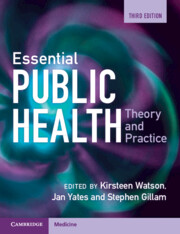Book contents
- Essential Public Health
- Essential Public Health
- Copyright page
- Contents
- Contributors
- Foreword
- Acknowledgements
- Introduction
- Part 1 The Public Health Toolkit
- 1 Health Needs Assessment
- 2 Health Information
- 3 Epidemiology
- 4 Evidence-Based Health-Care
- 5 Decision-Making and Priority Setting
- 6 Improving Quality of Care
- 7 Management, Leadership and Change
- 8 Improving Population Health
- 9 Screening
- 10 Health Protection and Communicable Disease Control
- Part 2 Contexts for Public Health Practice
- Glossary
- Index
- References
1 - Health Needs Assessment
from Part 1 - The Public Health Toolkit
Published online by Cambridge University Press: 01 December 2023
- Essential Public Health
- Essential Public Health
- Copyright page
- Contents
- Contributors
- Foreword
- Acknowledgements
- Introduction
- Part 1 The Public Health Toolkit
- 1 Health Needs Assessment
- 2 Health Information
- 3 Epidemiology
- 4 Evidence-Based Health-Care
- 5 Decision-Making and Priority Setting
- 6 Improving Quality of Care
- 7 Management, Leadership and Change
- 8 Improving Population Health
- 9 Screening
- 10 Health Protection and Communicable Disease Control
- Part 2 Contexts for Public Health Practice
- Glossary
- Index
- References
Summary
The first element of understanding how to improve the health and well-being of a population relies on a thorough assessment of the needs of the specified population, be it a local population defined by geography, a specific age group or those with certain characteristics. This chapter begins by considering how ‘health need’ can be conceptualized; the distinction between need, demand and supply; and the difference between health needs and the need for health-care. Secondly, the wider determinants of health are introduced and their relation to health needs discussed. Finally, the steps involved in a systematic assessment of the health needs of a defined population are explained, including tools and resources used to achieve this. Practical challenges are considered.
- Type
- Chapter
- Information
- Essential Public HealthTheory and Practice, pp. 13 - 26Publisher: Cambridge University PressPrint publication year: 2023



